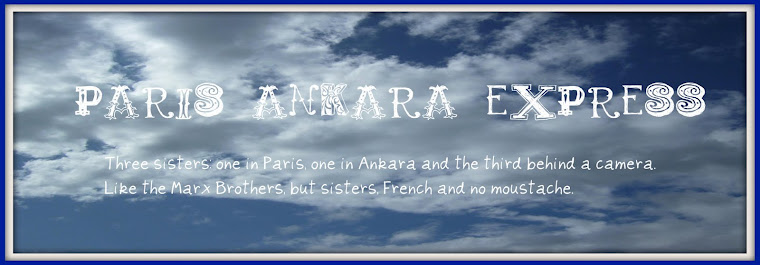'He's not autistic', he tells me, three
lines into our conversation.
It's my son, he's talking about, not his
own, the three-year-old struggling to escape from his father's grasp
so he can slide down to play on the floor. Not quite his business,
you may think. Except of course, that I'm at the special education centre, where autism
is everybody's business. He tries to explain, but he struggles, as
his English is not what it used to be – he studied at an English
language university, as I know from a previous meeting. Max can
speak, he wants to say, he's friendly, so he's not autistic. I point out that even
now that Max has made so much progress, we're still experiencing
quite a few difficulties related to his autism. The fact that if the
slightest thing freaks him out at school he refuses to go the next
day, and is incapable of telling us why. The fact that he still has
temper tantrums that make us worry the neighbours will report us to
security, again. The fact that the rare conversations we have with
him are only ever about what he's drawing or transportation, who
lives where and where we're going to on holiday. Not that I'm
complaining: it's wonderful that he can speak at all, the tantrums
are a fraction of what they used to be and he goes to school often
enough that he's actually learning stuff.
No, the man replies: that's just what
every parent goes through. Autism, he adds, is just a name. The words
'triad of impairment' come to my lips. But then, I'm never entirely
sure about this classification. I mention that Max, probably like his
own son, finds certain kinds of social interactions difficult and
that his language development is still quite far behind that of the
children – two years younger than him – in his class. So while
he's sweet enough when parents and teachers at the center ask him how
he is, and while this is a huge achievement compared to how he used
to be, it's not something that will help him make friends in the
school yard. He's blessed with seriously good looks, so there's
always a gaggle of little girls queuing up to play with him, help
him. But he's never just going to join a game of football: he doesn't
understand the rules, and he wouldn't know how to communicate with
those who might explain. So he plays alone.
Among the older kids who go on Saturday
mornings, Max is probably the one who has the easiest time both
socially and academically. There's a teenage girl who is, as far as I
can tell, non-verbal, meaning that she doesn't speak, or very little
- although as far as I know she could be a very fluent writer: autism
is weird, like that. There's a big boy who seems like a fluent enough
speaker, but altogether avoids eye contact, at least when he's at the
center. Max must seem like a success story, to parents of toddlers,
when compared with those. Max is the kid they'd like their own to be
most like. They cannot really project anything more suited to their
child's personality: for all his talk of autism being just a word,
the father who spoke to me is almost certainly persuaded that his own
son will grow up to be like Max, not like the other two. At three,
the boy is beginning to speak. He has good eye contact, seems to be
fairly well-behaved, and doesn't do a lot of stimming (repetitive
movement or noise that autistic people sometimes do). Max at the same
age was a whole different story. There's no reason to expect that
anyone will grow up to be like Max.
The father of the three year old wants
to make his point further – that Max is not autistic – by
speaking directly to him, in English. I must have told him three
times already that Max's English is very limited, but that he's
fluent in both French and Turkish. By this point, another mother has
joined in to the discussion of my son's autism. Oh yes, she says,
having to learn several languages will mix up his head – that is
well known. And then she, too, proceeds to speak to Max in English.
In the end, both Max and I were polite. Max offered a few slightly
puzzled 'Yes' s to their questions, and I did not say that Max's
Turkish was vastly superior to their English. And then we left.


1 comment:
I love reading your writings, especially about Max.
Post a Comment